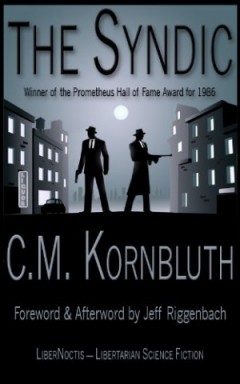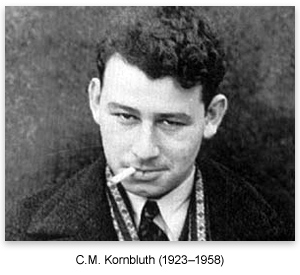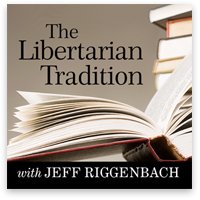In a recent addition to The Libertarian Tradition podcast series, part of the Mises Institute’s online media library, Jeff Riggenbach discusses the brief life of C.M. Kornbluth (1923–1958) and his novel The Syndic.
You can also read the transcript below:
The late Samuel Edward Konkin III was a firm believer in the power of science fiction to spread the libertarian message. He himself had been converted to libertarianism partly by reading the works of Robert A. Heinlein, and Heinlein remained his favorite science fiction writer for the rest of his life. Every July for years, he threw a joint birthday party for himself and Robert A. Heinlein (Sam’s birthday was July 8; Heinlein’s was July 7). The last and largest issue of his magazine,New Libertarian, was devoted to Heinlein, as was a sort of mini-conference he held, also in the late 1980s, under the auspices of his Agorist Institute. This mini-conference featured presentations by Sam, J. Neil Schulman, and yours truly, along with much spirited discussion.
But if the works of Robert A. Heinlein topped Sam’s list of great libertarian science fiction, they were far from the only titles on that list. He was also a great admirer of Eric Frank Russell’s Great Explosion, for example. He expressed enthusiasm for A.E. van Vogt’s fiction, especially The Weapon Shops of Isher. And, he told me more than once in conversation, he held C.M. Kornbluth’s 1953 novel, The Syndic, in high esteem and considered it lamentably little known and much underappreciated among libertarian science fiction novels. I suspect part of the reason Sam never wrote about The Syndic was that he felt any public display of approval on his part for a writer like C.M. Kornbluth would require at least a bit of explanation. You see, Kornbluth was a Futurian, and libertarian science-fiction fans back in Sam’s heyday — the 1970s and ’80s — were almost always critical of the Futurians, if not openly hostile to them.
Libertarian science fiction fans of today care a good deal less for such ancient controversies, I suspect. Libertarian science-fiction fans under 40 are probably at least a little unclear on just who or what the Futurians were. Those old timers like me who know who they were have now lived long enough that we wonder whether it really matters who they were — whether it mattered even at the time.
Briefly, mercifully, the Futurians were members of a science fiction club in Manhattan in the late 1930s and early 1940s. The club membership included a number of young fans who later became very influential as science fiction writers and editors: Isaac Asimov, Frederik Pohl, James Blish, Damon Knight, Judith Merrill, Donald Wollheim, and C.M. Kornbluth. All these people were born in the decade following the beginning of World War I — between 1914 and 1923.
The Futurians had broken off from the Greater New York Science Fiction Club in 1938, because they held certain political views they wanted to see emphasized in science fiction — what most people would call “leftist” political views. Some of the Futurians, like Wollheim and Pohl, were members of the Communist Party of the United States of America, if only briefly. Others, like Judith Merrill, were Trotskyites. Still others were New Deal Democrats of what I suppose you might call the Henry Wallace strain. More or less all of them were therefore, in the eyes of libertarians like Sam Konkin and Eric Raymond, traitors to the very spirit of science fiction, which both Konkin and Raymond took to be libertarian.
On the other hand, Sam Konkin thought he spotted something libertarian about C.M. Kornbluth’s 1953 novel, The Syndic. And he was not the only libertarian who did so.1 Another was Michael Moorcock. Now Moorcock is not a libertarian of our sort. He’s a libertarian of the other sort — the kind who imagines a society without coercive government (which is to say, without the State), but in which, by some mysterious magic, no one would be “allowed” to own property or invest savings in a productive enterprise in the expectation of future profit.
In his 1977 essay “Starship Stormtroopers,” Moorcock rails against Heinlein, Rand, and other science fiction writers whom libertarians of our sort tend to venerate. And he writes that “Leaving aside the very worthy but to my mind journalistic The Dispossessed by U.K. Le Guin, it is quite hard for me to find many other examples of sf books which, as it were, ‘promote’ libertarian ideas.” Nevertheless, he does come up with a few titles, then comments: “I also have a soft spot for C.M. Kornbluth who to my mind had a rather stronger political conscience than he allowed himself, so that his stories are sometimes confused as he tried to mesh middle-American ideas with his own radicalism. One of my favorites … is The Syndic.”
So what exactly do we find if we open a copy of The Syndic and begin reading? In effect, we find a dramatization of the following quotation from Murray Rothbard. “If you wish to know how libertarians regard the State and any of its acts,” he wrote in For a New Liberty, “simply think of the State as a criminal band, and all of the libertarian attitudes will logically fall into place.”
More specifically, when you open the first pages of The Syndic, you find yourself in the company of a character named Charles Orsino, who lives in New York and works as a bagman for The Syndic. He walks around the 2.5 square miles of the 101st New York Police Precinct (it’s in Queens if that matters) collecting protection money from small businesses. Near the very beginning of the story, he drops in at Mother Maginnis’s Ould Sod Pub, only to be told by Mother Maginnis herself that “it’s the business, Mr. Orsino. It’s the business. You’ll pardon me if I say that I can’t see how to spare twenty-five dollars from the till, not if my life depended on it. I can go to fifteen, but so help me — ”
That’s when Orsino cuts her off. “You realize, Mrs. Maginnis,” he tells her, “that you’re letting the Syndic down. What would the people in Syndic Territory do for protection if everybody took your attitude?” But he lets her slide with a fifteen-dollar payment this week. Orsino likes it best if things remain pleasant and cordial between him and the people he thinks of as his “customers.” He reflects, after leaving Mother Maginnis’s bar, that “it was pleasant to be able to do things for nice people; it was pleasant to stroll along the sunny street acknowledging tipped hats and friendly words.”
These events are happening, by the way, about 150 years from now, sometime in the late 22nd century. Civilization has pretty much collapsed in the world outside North America. Places like Europe have reverted to forest and are thinly inhabited by Neolithic tribes living in caves, lean-tos, and mud huts, and hunting with spears. North America is divided into Syndic Territory and Mob Territory. The Syndic runs things in the East; the Mob runs things in the West.
As Orsino’s Uncle Frank, a Syndic higher-up, relates the relevant history: in the beginning, people
demanded inexpensive liquor, tobacco and consumer goods, clean women and a chance to win a fortune; and our ancestors obliged them. Our ancestors were sneered at in their day, you know. They were called criminals when they distributed goods and services at a price people could afford to pay.
Government incessantly harassed these so-called criminals and also adopted various policies that left the people with less and less discretionary income. And ultimately, “when [people had] had enough hounding and restriction, they rose in their might. [They] demanded freedom of choice, [men of talent and ingenuity] rose to lead them in the Syndic and the Mob, and they drove the Government into the sea.” The Government was now “located on Iceland. … The Canaries and Ascencion were outposts.” It was from these islands in the Atlantic that the Government, as Uncle Frank puts it, “still occasionally ventures to annoy our coastal cities.”
In Uncle Frank’s view, the Government and the “old-time bankers” who backed it “deserved everything they got. They brought it on themselves,” he tells Charles.
They had what they called laissez-faire, and it worked for a while until they got to tinkering with it. They demanded things called protective tariffs, tax remissions, subsidies — regulation, regulation, regulation, always of the other fellow. But there were enough bankers on all sides for everybody to be somebody else’s other fellow. Coercion snowballed and the Government lost public acceptance. They had a thing called the public debt which I can’t begin to explain to you except to say that it was something written on paper and that it raised the cost of everything tremendously. Well, believe me or not, they didn’t just throw away the piece of paper or scratch out the writing on it. They let it ride until ordinary people couldn’t afford the pleasant things in life.
As our story begins, the Mob and the Syndic, under the terms of the Treaty of Las Vegas, signed during the late 21st century, have been at peace for a hundred years. This is not to say that they think highly of each other, or anything like that. As one Syndic bigwig puts it,
I won’t pretend I’m happy about the way things are in Mob Territory. … I won’t pretend I think the Mob clients are enjoying anywhere near the service that Syndic clients enjoy. I’m perfectly aware that on our visits of state to Mob Territory we see pretty much what our hosts want us to see. But I cannot believe that any group which is rooted on the principles of freedom and service can have gone very wrong.
As for the North American Government, as it rather grandiosely calls itself, the same Syndic bigwig says:
As long as they stick to a little commerce-raiding and a few coastal attacks, I can’t say I’m really unhappy about them. They don’t do much harm, and they keep us on our toes and — maybe this one is most important — they keep our clients’ memories of the bad old days that we delivered them from alive.
But this relatively benign view of the Government is not shared by all the Syndic leadership. As another of them says, somewhat indignantly,
Let me point out what the so-called Government stands for: brutal “taxation,” extirpation of gambling, denial of life’s simple pleasures to the poor and severe limitation of them to all but the wealthy, sexual prudery viciously enforced by penal laws of appalling barbarity, endless regulation and coercion governing every waking minute of the day. That was its record during the days of its power and that would be its record if it returned to power. I fail to see how this menace to our liberty can be condoned by certain marginal benefits which are claimed to accrue from its continued existence.
Of course, the Syndic is not held in high regard by the Government either. A Government bureaucrat working in Ireland is shocked — shocked! — at the absence of victimless crime laws in Syndic Territory, and at the absence, as he sees it, of “respect for the home, sanctity of marriage, sexual morality, law and order.” He splutters almost apoplectically to a resident of Syndic Territory whom he happens to meet: “I know how you people live. Are you telling me you don’t have sexual promiscuity? Polygamy? Polyandry? Open gambling? Uncontrolled liquor trade? Corruption and shakedowns?” A secret Government agent operating in Syndic Territory and frustrated by his failure to locate someone he is trying to find notes ruefully that “in the crazily undisciplined Syndic Territory it was impossible to trace anybody.”
Charles Orsino’s Uncle Frank is adamant on one point: “‘We are not a government!’ he always yelled. ‘We are not a government! We must not think like a government!'” And again, in a calmer moment: “The Syndic is not a government. It must not become enmeshed in the symbols and folklore of a government or it will be first chained and then strangled by them.”
After Orsino is sent as an undercover Syndic spy to infiltrate the North American Government, he has many adventures, during which he sees for himself how things are both for subjects of the Government and for those who live in Mob Territory. And the reader comes to realize, by watching over Orsino’s shoulder, so to speak, that, partly thanks to Uncle Frank’s unrelenting advice on this point, Syndic Territory is the most nearly libertarian of the three more or less civilized societies depicted in Kornbluth’s novel.
How could a member of the dreaded Futurians write so libertarian a novel? We should not forget how very young Kornbluth was when he joined the newly formed Futurians. He was 15 years old. He was born in 1923 and was still in high school when he started writing science fiction and crime fiction professionally — that is, for money. When he graduated from high school, in his native New York City, he went off to the University of Chicago for some higher education. But his sojourn there was interrupted by World War II.
After the war, Kornbluth returned to Chicago, finished up his degree, and began working in journalism, a trade he continued to practice after his return to New York in the late 1940s. In those same postwar years, back in his hometown, among his old friends, he resumed contributing to the science fiction magazines that had been such an important part of his life when he was in high school. He also began writing novels. By the time he wrote The Syndic, he was 29 and had seen a little of life and the world. I think he’d seen through the political absurdities he had believed in when he was 15. He had come to realize that the state was just another gang, worse than some but fundamentally no different.
Kornbluth was born with a weak heart. On the first day of Spring 1958, he had an appointment in New York, and when he came out of his Long Island home to jump in his car and drive over to the train station, where he could catch the Long Island Railroad into The City, he found that a rare late snowfall had blocked his driveway. He attempted to shovel his driveway, but ran out of time. He could hear the train coming. He decided to run for it. He made it to the station platform on time, but he never got on the train. He died on the platform of a heart attack. He was 34 years old.
The name of Cyril M. Kornbluth no longer looms as large as it once did in the annals of science fiction. The Syndic is currently out of print — though it can be had as a digital download, its complete text is posted online, and it’s easy to find secondhand copies of it on the used book market. Libertarians in particular have good reason to remember this novel and to keep its memory alive.
[This article was first published online as a Mises Daily article and is transcribed from the Libertarian Tradition podcast episode “C. M. Kornbluth (1923–1958).”]
The Syndic won the Libertarian Futurist Society’s Prometheus Hall of Fame Award in 1986. ↩

















